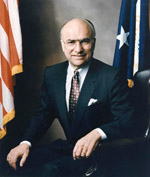Yeutter Institute of International Trade and Finance
LIBERALIZED AGRICULTURAL TRADE -- AT THE MULTILATERAL TRADE NEGOTIATIONS, BILATERALLY OR NOT AT ALL!
Date of this Version
7-20-1976
Document Type
Article
Citation
Annual Meeting Western Agricultural Economics Association
Abstract
For most of the 20th century, much of the world has fretted about agricultural surpluses. This has been particularly true of the major producing nations, with the United States being in the forefront. Only a decade ago, our "ever normal granaries" were bursting at their steel seams, and we were immersed in another agonizing appraisal of U.S. farm policy.
Then the shock came! In 1972 everything went wrong on the production front droughts, early frosts, monsoon problems, even the fish meal supply diminished because of an uncooperative ocean current. We suddenly realized that man was not quite as omniscient as he thought, especially in the field of weather control. And the Soviets realized that they had a demanding consumer sector, even under a totalitarian regime. All of this caused reverberations throughout this planet of ours, and the "world food problem" was born. Attention turned from surplus disposal programs to concern over production and access to that production.
Included in
Agricultural and Resource Economics Commons, International and Area Studies Commons, International Economics Commons, International Relations Commons


